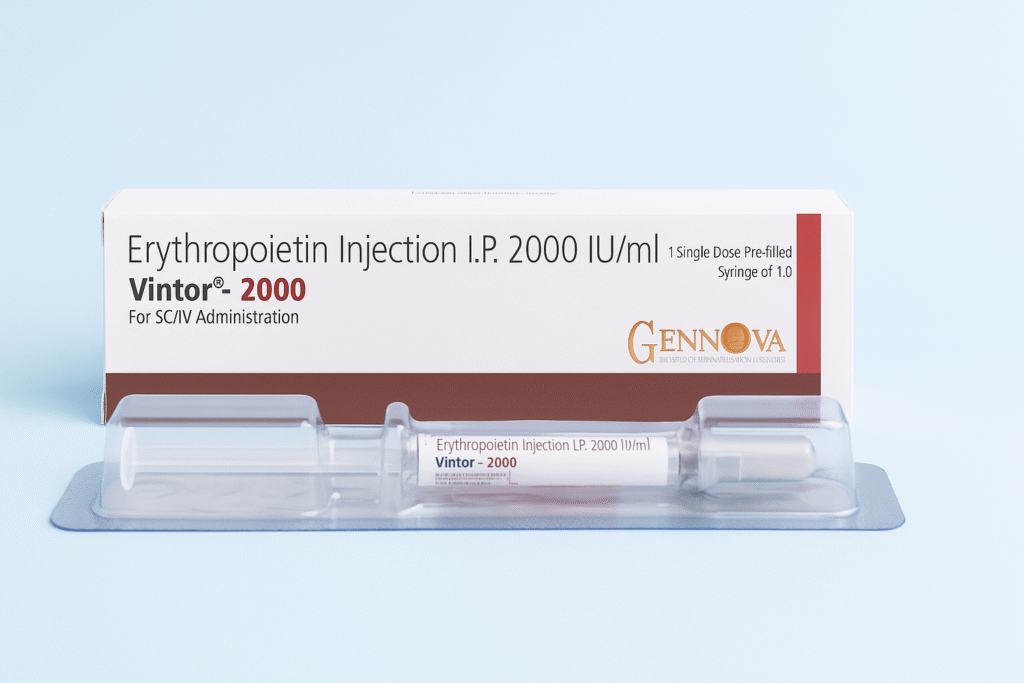Erythropoietin Injection 2000 IU/mL: Boosting Red Blood Cells for Vitality
Description
Erythropoietin (EPO) Injection 2000 IU/mL is a sterile solution of recombinant human erythropoietin alfa (or similar epoetin analog). Erythropoietin is a naturally occurring hormone primarily produced by the kidneys, which plays a critical role in stimulating the production of red blood cells in the bone marrow. This injectable form provides a synthetic version of this hormone, designed to treat anemia by increasing the number of red blood cells (erythropoiesis) in individuals whose natural erythropoietin production is deficient or impaired. The 2000 IU/mL concentration allows for precise dosing, especially in patients requiring lower or carefully titrated amounts. It can be administered intravenously (IV) or subcutaneously (SC).
Advantages
- Effective Anemia Treatment: Directly stimulates red blood cell production, effectively treating anemia caused by various underlying conditions.
- Reduces Transfusion Needs: Can significantly reduce or eliminate the need for red blood cell transfusions, avoiding associated risks and improving patient convenience.
- Improves Quality of Life: By correcting anemia, it helps alleviate symptoms such as fatigue, weakness, shortness of breath, and dizziness, leading to an improved sense of well-being.
- Specific Action: Mimics the body’s natural hormone, providing a targeted approach to addressing insufficient red blood cell production.
- Versatile Administration: Can be given intravenously (e.g., for dialysis patients) or subcutaneously (for home administration or convenience).
Uses
Erythropoietin Injection 2000 IU/mL is primarily used for the treatment of anemia associated with:
- Chronic Kidney Disease (CKD): In patients with CKD, both on and not on dialysis, whose kidneys do not produce enough natural erythropoietin.
- Chemotherapy-Induced Anemia: In adult patients with certain non-myeloid malignancies receiving myelosuppressive chemotherapy, to reduce the need for red blood cell transfusions.
- Zidovudine-Treated HIV-Infected Patients: To treat anemia caused by zidovudine therapy in HIV-infected patients.
- Reduction of Allogeneic Red Blood Cell Transfusions in Surgery: In certain high-risk adult patients undergoing elective, noncardiac, nonvascular surgery to reduce exposure to allogeneic (donor) blood transfusions.
- Anemia of Prematurity: In premature infants with low birth weight.
Nature
Erythropoietin (epoetin alfa/beta) is a recombinant glycoprotein hormone that is structurally and biologically identical to human erythropoietin.
Its mechanism of action involves:
- Binding to Erythropoietin Receptors: Epoetin binds to specific erythropoietin receptors (EPO-R) located on the surface of erythroid progenitor cells in the bone marrow.
- Stimulating Erythropoiesis: This binding activates intracellular signaling pathways (e.g., JAK2/STAT pathway) that lead to the proliferation (multiplication), differentiation (maturation), and survival of these red blood cell precursor cells.
- Increased Red Blood Cell Production: The ultimate result is an increased production of mature red blood cells (erythrocytes), leading to an increase in hemoglobin and hematocrit levels in the blood.
- Counteracting Anemia: By boosting the red blood cell count, erythropoietin effectively counters the effects of anemia, improving oxygen-carrying capacity throughout the body.
Storage
- Refrigeration: Erythropoietin Injection 2000 IU/mL must be stored in a refrigerator between 2∘C to 8∘C (36∘F to 46∘F). It is sensitive to temperature fluctuations.
- Do Not Freeze: Freezing will inactivate the product and should be strictly avoided. If inadvertently frozen, the product must be discarded.
- Protect from Light: Keep the vials or pre-filled syringes in their original carton to protect them from light.
- Do Not Shake: Do not shake the product vigorously, as this can denature the glycoprotein and reduce its effectiveness.
- Single-Dose Vial/Pre-filled Syringe: Most formulations are for single-dose use. Any unused portion should be discarded immediately after drawing the dose, as they typically do not contain preservatives.
- Bring to Room Temperature (Before Use): If a dose is to be self-administered, it is recommended to let the syringe or vial sit at room temperature for about 15-30 minutes before injection for more comfortable administration, but do not leave it out for extended periods.
- Keep Out of Reach of Children: Store the medication securely, away from children and pets.
- Check Expiry Date: Always check the expiry date on the packaging and do not use the injection beyond this date.

